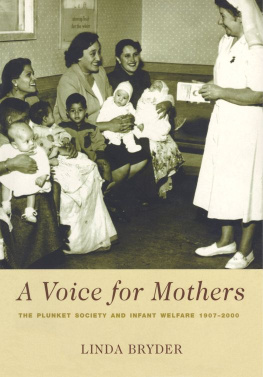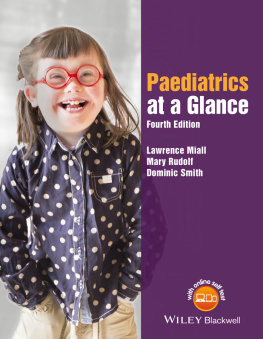Plunket Society to Chief Health Officer, Thomas Valintine, arguing the case for societys right to control infant welfare, 1911, Plunket Society Archives, AG7 536.
Most New Zealanders, or their mothers, have retained their Plunket Baby Record Book as a treasured memento of an important life stage. Our family is no exception. As a shy young Danish immigrant in the 1950s my mother recalls with pleasure her visits to the Plunket nurse in Auckland, Sister Aileen Rountree, whom she describes as just lovely, so reassuring. My own experiences with Plunket nurse Yvonne Robinson in the 1990s were equally positive. Many New Zealanders share this opinion. After I had spoken about the Society at a medical history conference in 1994, one member of the audience wrote to me in the following terms: Congrats on sticking up for Plunket. My mother brought up eight kids with Plunket assistance she thought they were excellent. And Heaven help anyone who tried to impose any notions on my mother. Plunket nurses have not always had a good historical press. In this book I am not sticking up for Plunket, and yet the research gave me great respect for the women who fought so hard for the service and the nurses whom they employed.
I wish to thank the Auckland branch of the Plunket Society and in particular its former president and treasurer, Averill Matthews, who alerted me to the existence of historical records then held at the branchs headquarters in Auckland. As a medical and social welfare historian I was fascinated by these records, which formed the basis of NotJustWeighingBabies:PlunketinAuckland,19081998. The research undertaken for this book prompted me to explore the full story and I am grateful to the Plunket Societys national office staff, in particular John Thompson, Paul Baigent, Graig Pollock and Gail Max for their helpfulness and friendliness, and for allowing me access to the Societys voluminous records. Thanks also to former Plunket nurse Joyce Powell for sharing with me her personal experiences and allowing me access to her taped interviews with other Plunket nurses. I am also grateful to broadcaster Jim Sullivan for having the foresight to create a Plunket Society oral history archive, held at the Turnbull Library. Helpful comments and feedback were received from Plunkets former medical and assistant medical directors, David Geddis and Ian Hassall. In particular I was buoyed by Ian Hassalls encouragement and enthusiasm for my project.
There are various institutions and their staff I wish to thank such as Archives New Zealand, Alexander Turnbull Library, Auckland Museum Library, Auckland Public Library, and the University of Otago Medical School library. Special thanks go to the staff of the Hocken Library of the University of Otago, and to Chief Archivist Stuart Strachan and his wife Jean, who have always shown me such wonderful hospitality when I have visited their city. I was privileged to know the late David McDonald, the Hockens incomparable reference librarian, and to benefit from his vast knowledge. I am grateful to the University of Auckland for the award of a Staff Research Grant to aid this research. Thanks also to the Wellcome Institute Library and the Highgate Literary and Scientific Institution in London, and to the Wellcome Trust for a Short-term Travel Grant enabling me to visit London. For the right to reproduce photographs and cartoons I am grateful to Archives New Zealand, the Turnbull Library, Hocken Library, Metro, the Auckland Museum, Barry Gustafson, the Plunket Society and its Auckland branch. Thanks also to Plunket nurse Ripeka Mokaraka for her friendliness and helpfulness in identifying individuals in recent photographs held at Plunkets national office.
Finally I wish to thank my partner Derek Dow for his unfailing support and encouragement and my sons Dennis and Martin. I knew this research must have rubbed off when Dennis came home from school one day having chosen to do a school project on Truby King!
LindaBryder
The motto of the Royal New Zealand Plunket Society has always been to help the mothers and save the babies. and with its many clinics and six baby (Karitane) hospitals, it remained a society run by women for women. Men were involved as fathers, handymen, and medical, legal and financial advisers but they took a back seat until relatively recently.
Plunket has often been heralded as New Zealands most successful voluntary organisation and certainly its most famous. Returning from an overseas trip in 1923, Dr Ada Paterson expressed her surprise at the praise she had heard of Plunket wherever she went: After a years investigations, I have come back more than ever impressed with the great value of Dr Kings work.
Plunket was usually given the credit for New Zealands low infant death rates during the first half of the twentieth century, a source of great national pride. As Bryson noted, and as has been pointed out by historians who have examined the early twentieth-century infant welfare movement, in New Zealand as elsewhere, there were other factors involved in the decline. One important factor was the reduction in family size: women who married in 1880 averaged 6.5 live births when their families were completed and their 1923 equivalents 2.4.
During the second half of the twentieth century New Zealand could no longer claim this record. This was partly because the rest of the Western world caught up: thanks to improved infant feeding formulae, higher standards of domestic hygiene including refrigeration, antibiotics and improved methods of rehydration, infant diarrhoea was no longer the killer of former years. Other causes of death began to assume a greater importance, and here New Zealands record was not so good cot deaths, accidents in the home and on the roads, child abuse and diseases for which some other countries were more effectively immunised all took their toll. Plunket nurses continued to offer support and assistance at an individual level, but wider social, political and economic changes affected overall infant health. This did not mean that the Plunket Society was failing the country. Plunket became involved in research, funding visits from overseas experts, mass immunisation campaigns, the detection of abuse, accident prevention campaigns and counselling and support for cot deaths. Cutbacks and targeting of services were regretted by the society at a time when support was considered more important than ever. Yet changes in the organisation itself and in late twentieth-century society meant that it lost its status as a powerful and confident womens movement demanding resources for infant and child welfare.
Plunket was always concerned with more than preventing deaths. It viewed itself as a Health Society and aimed to provide support for parents.
The Plunket Society has always had its critics. The Health Department
This history sets out to place Plunket in the context of three broad themes: the relationship between the voluntary sector and the state in the provision of welfare, the development of paediatrics as a specialty and changing trends in infant health, and the relationship between health providers and their clients, the mothers. Underlying these themes are the ways in which the New Zealand experience paralleled or differed from that of comparable countries such as Britain and the United States.
The mixed economy of welfare and maternalist welfare
Recent historical scholarship in Europe and the United States has pointed to the continuing role of the non-state sector in providing welfare, resulting in a mixed economy of welfare or welfare pluralism. This history explores the way in which the women who ran Plunket succeeded in retaining control of an important area of welfare in the face of Health Department opposition, despite the fact that they had no technical expertise or training in providing health services.










